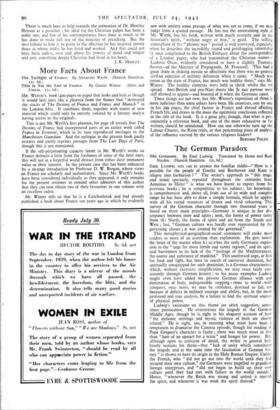More Facts About France
The Twilight of France. By Alexander Werth. (Hamish Hamilton. This is Not the End of I2S. 6d.) France. By Gustav Winter. (Allen and Unwin. I2s. 6d.)
MR. WERTH'S book (40o pages on paper that looks and feels as though it would last) rises like a phoenix from the flames that "destroyed the stocks of The Destiny of France and France and Munich" in the London blitz. It combines them, together with traces of new material which could only be entirely isolated by a literary analyst having access to the originals.
This is not Mr. Werth's first phoenix, for page 18 reveals that The Destiny of France had incorporated parts of an earlier work called France in Ferment, which in its turn reproduced messages to the Manchester Guardian. And the epilogue to the present book partly restates and partly reprints passages from The Last Days of Paris, though this is not mentioned.
If the self-perpetuating capacity latent in Mr. Werth's works on France detracts a little from the freshness of some of the later ones, this will not in a forgetful world detract from either their immanent value or their interest. In the present case this has been enhanced by a zo-page introduction by Professor D. W. Brogan, whose views on France are scholarly and authoritative. Since Mr. Werth's books have been considered individually as they appeared, it only remains for the present reviewer to remind other admirers of this author that they can now obtain two of their favourites in one volume with an excellent index.
Mr. Winter tells us that he is a Czechoslovak and had already published a book about France ten years ago in which he evidently
saw with anxiety some presage of what was yet to come, if we may judge from a quoted passage. He has not the entertaining style of Mr. Werth, but his book, written with much restraint and in the historian's spirit, " without anger or bias," is good. The stifling atmosphere of the " phoney war " period is well conveyed, especially when he describes the incredibly stupid and pettifogging censorship (it once complained to the British Embassy about the correspondent of a London paper, who had transmitted the Christian names- Ludovic Oscar, evidently considered to have a slightly Teutonic flavour—of the Minister of Propaganda, M. Frossard). This had a great share in shaking morale so effectively that there was no general civilian rejection of military defeatism when it came. " Much was rotten in the state of France, but much was healthy there," says Mr. Winter. The healthy elements were held in check whilst the rot spread. Anti-British and pro-Nazi sheets like 7e suis pattout were still allowed to appear—and boasted of it when the Germans came.
These things are not new, but Mr. Winter's exposition of them is more judicious than some others have been. He examines, one by one in his 299 pages, the chief factors in France and abroad' affecting French life, and draws in the main the optimistic conclusion reflected in the title of the book. It is a great pity, though, that what is pre- eminently a reference book, and one of the most exhaustive so far written, should be unindexed. How can one otherwise turn up the Labour Charter, the Riom trials, or that penetrating piece of analysis of the influence exerted by the various religious leaders?
BERNARD FOLEY.


























 Previous page
Previous page